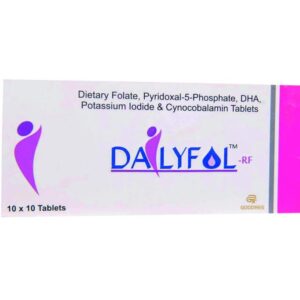CYANACOBALAMINE + DHA + PYNDOXINE HCI
Cyanacobalamine: Cyanocobalamin is a synthetic form of vitamin B12, also known as cobalamin. It is commonly used to treat vitamin B12 deficiency, which can occur due to various reasons such as poor diet, gastrointestinal conditions, or certain medications.
The primary function of cyanocobalamin is to support the production of red blood cells and maintain a healthy nervous system. It is essential for the synthesis of DNA and the proper functioning of nerve cells.
Cyanocobalamin is available in various forms, including oral tablets, injections, and nasal spray. The route of administration depends on the severity of the deficiency and the patient’s ability to absorb vitamin B12 through the gastrointestinal tract.
The recommended dose of cyanocobalamin varies depending on the patient’s age, the severity of the deficiency, and the route of administration. For oral supplementation, typical doses range from 25-1000 micrograms per day. Injection or nasal spray forms may require higher doses initially, followed by maintenance dosages.
Cyanocobalamin is generally well tolerated, and side effects are rare. However, some individuals may experience mild side effects such as nausea, diarrhea, headache, or mild skin reactions. In very rare cases, allergic reactions can occur, leading to severe symptoms like difficulty breathing, hives, or swelling of the face, lips, or throat. If any unusual or severe side effects occur, it is important to seek medical attention immediately.
It is essential to use cyanocobalamin only as directed by a healthcare professional and to follow the prescribed dosage regimen. Taking more significant doses than recommended or using it without a clear indication can lead to potential side effects and complications.
Dha: DHA (Docosahexaenoic acid) is an omega-3 fatty acid that is commonly found in fatty fish like salmon, mackerel, and sardines. It is available in dietary supplements and is used to improve brain function and overall health.
The mechanism of action of DHA is not fully understood, but it is believed to play a crucial role in the structure and functioning of the brain and retina. It is a major component of the phospholipids in cell membranes, especially in neurons and photoreceptor cells, where it is essential for proper function.
The recommended daily dose of DHA varies depending on age and health conditions. For adults, the typical dose ranges from 200-500 mg per day. It is important to follow the instructions provided on the specific supplement.
DHA is generally safe for most individuals when taken orally at recommended doses. However, some people may experience mild side effects such as gastrointestinal disturbances (e.g., diarrhea, nausea), fishy aftertaste, or burping. These side effects can be minimized by taking the supplement with meals or choosing enteric-coated capsules.
It is important to note that DHA supplements may interact with certain medications such as blood thinners. Therefore, it is crucial to consult with a healthcare professional before starting DHA supplementation, especially if you have any underlying health conditions or are taking prescription medications.
Overall, DHA is an essential omega-3 fatty acid that offers potential benefits for brain health and overall well-being. However, individual responses may vary, and it is always recommended to consult with a healthcare professional before starting any new supplement regimen.
Pyndoxine Hci: Pyridoxine HCl, commonly known as vitamin B6, is a water-soluble vitamin that plays a crucial role in various bodily functions. In its synthetic form, pyridoxine HCl is available as a medication and is used to treat and prevent vitamin B6 deficiency.
Pyridoxine HCl is essential for the metabolism of proteins, carbohydrates, and fats. It aids in the synthesis of neurotransmitters, such as dopamine, serotonin, and GABA, which are crucial for maintaining normal brain function. Additionally, it is involved in the production of red blood cells and supports the immune system.
The recommended dose of pyridoxine HCl varies depending on the age and condition being treated. For adults, the typical daily dose ranges from 2-100 mg. The dosage can be higher for certain conditions, such as vitamin B6 deficiency associated with certain medications.
Pyridoxine HCl is generally considered safe and well-tolerated when taken within the recommended dosage range. However, high doses of pyridoxine HCl exceeding 200 mg per day for a prolonged period may result in symptoms of peripheral neuropathy, characterized by numbness and tingling in the hands and feet. This condition is usually reversible when the medication is discontinued. Other possible side effects include nausea, headache, drowsiness, and sensory disturbances.
It is important to consult with a healthcare professional before starting any new medication, including pyridoxine HCl, to determine the appropriate dosage and ensure that it is safe and suitable for your specific needs.

